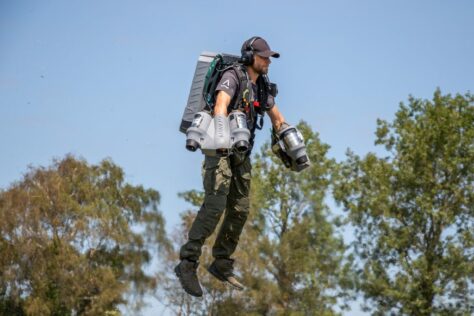If you caught any of the notorious UK music festival, Glastonbury at the weekend, you might have spotted the remarkable sight of a jetpack-powered pizza delivery.
The spectacle was orchestrated by pizza firm Domino’s and first showcased on Tuesday afternoon amid stunned festival onlookers, and it coincided well with the closing performance of the weekend – the original ‘Rocket Man’, by legendary musician, Elton John who headlined on the Pyramid stage on Sunday evening.
Sam Wilson of Domino’s said: “When we realised pitching up to serve slices inside the festival was impossible, we took inspiration from this year’s headliner to launch our own rapid delivery trial – it was a bit of a no brainer!”

The Bigger Picture
The jetpack itself, the world’s first patented jet suit, is a product of Gravity Industries, who a few years ago partnered with Ricoh 3D on the development of a polypropylene structure for their product, designed to bring superhuman flight to life.
Ricoh 3D’s Additive Manufacturing Manager, Mark Dickin said: “3D printed polypropylene is a unique material that is strong, chemically resistant, lightweight, and flexible. It enables manufacturers to prototype in the end-use material, which gave Gravity the design freedom to make human flight a reality.
“The original product is also 90% recyclable, lightweight and flexible while still being incredibly durable – ideal for taking to the skies!”
He added: “The Jet Suit is testament to the tenacity of engineering. By pushing the boundaries with both 3D printing and polypropylene, we’re showcasing what’s possible when you have the right expertise and ingenuity.”

Already, the jetpack has been used for aviation and flight-training purposes, and rural search and rescue trials (Great North Air Ambulance Service), as well as appearing in commercial features – and Ricoh hopes to see further developments contributing to key social issues.
In a previous interview, Gravity Industries Founder, Richard Browning commented: “Our partnership with Ricoh 3D has shown that anything is possible when you blend together entrepreneurship and technological innovation.
“I’ve always had a passion for unusual challenges and venturing into the unknown, so it’s incredible to see the dream ignite into life. We’ve built up an amazing global footprint since 2017, and Ricoh has enabled us to transform an ‘impossible’ idea into something viable for production.”
What’s next?
Fortunately for customers today, there is also a quick turnaround on production of the suit. It would previously take more than two weeks to custom build the core suit structure out of aluminium riveting and bolt together manually, but using Ricoh 3D’s technology, the print time is just 24 hours, taking assembly time from two weeks to two days.
Ricoh 3D looks forward to furthering the development of components for Gravity’s eSuit – contributing to the reduction of carbon emissions and aiding a number of industries.
